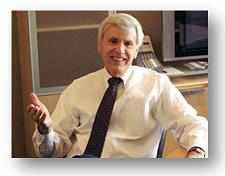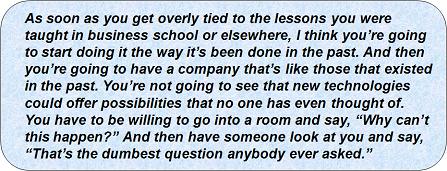At no other moment in our business lifetimes has the phrase, “the way we’ve always done it,” been more harmful to the health of our companies and our industries.
 Leadership books and articles are less than a dime a dozen. They are ubiquitous and yet, true learning and insight are hard to find especially in an environment where the only constant is change.
Leadership books and articles are less than a dime a dozen. They are ubiquitous and yet, true learning and insight are hard to find especially in an environment where the only constant is change.
That’s why when we hear great advice from an important voice, it’s worthy of attention. American Public Media’s Bill Kling is one of those rare CEOs with something to say that should resonate with both corporate leaders and those just getting started in the world of business. (APM produces public radio shows like Marketplace and A Prairie Home Companion.)
In a recent New York Times article, Kling goes off on a variety of topics revolving around creativity inside companies. I believe that every radio company has “the answers” deep inside its headquarters and/or at the station level. Too often, however, it is difficult to capture them for a variety of reasons – from top-down thinking to the crazy rate of speed at which everyone’s moving.
In this piece, Kling warns against the conventional wisdom that leads to sameness, lethargy, and ultimately failure:
Kling also speaks out about the value of letting everyone in the room have a say because each person has a different view of the problem. His philosophy is that “every perspective is additive.” Of course, it’s a great leader who can merge the best ideas, weed out the crap, and forge strategies that are truly forward-thinking.
We are trying this technique with much of the digital strategizing our company is engaged in. More and more, I find myself in conference rooms with station employees representing many departments and levels, working together to carve out social media and digital plans that complement their radio brands. It is hard work, but I find that the more diverse the room, the greater the chance for new, different, and thoughtful ideas to emerge.
There’s strength in a wide range of views from everyone in the organization, a theory that has proved out for Bill Kling. And at a time when there are fewer people in most organizations, tapping into those quiet, unassuming people – the ones who may not promote or market themselves well – may be a key to unlocking answers and crafting solutions.
Who are those people in your company? Do they have a seat at the table?
- What To Do If Your Radio Station Goes Through A Midlife Crisis - April 25, 2025
- A 2020 Lesson?It Could All Be Gone In A Flash - April 24, 2025
- How AI Can Give Radio Personalities More…PERSONALITY - April 23, 2025





Great post, Fred. And thank you for sharing my post on Social Media!
One of my favorite quotes says, “”Remember that the six most expensive words in business are: ‘We’ve always done it that way.'” Sadly, some organizations are finding that, “This is how we’ve always done it,” is no longer an acceptable answer for their clients. As a result, they’re playing a pretty tough game of catch-up.
Cheers,
Katie
Katie, thanks for reading our blog. The broadcast radio business is at a fascinating crossroads. The newspaper industry is a couple of miles further down the path. Good decisions, innovation, and creativity are greatly needed. Thanks for chiming in.
Dear Fred:
With regard to your articles yesterday and today, I like to think that Radio has taken the consumer reaction to Pandora and other digital audio entertainment options developments seriously. But I don’t think that the primary reasons people listen to radio are the same as the reasons people listen to Pandora (or iPods on random or genius, or cd players), so I don’t think the Kodak simile is altogether an accurate one.
If all that radio offered was “listening to music”, it would be. “Taking a picture” is taking a picture – that was the end game. Kodak chose to take quality of reproduction as the driving factor of selection and usage and ignore convenience, even though convenience had come up to bite them before (with the “instant picture” Polaroid market). They refused to let people capable of reframing what ‘photography’ meant sit at the table; their driving consideration was protecting their profits, not the future of the business. We saw the same thing with the American auto industry, which refused to consider changing their decrepit systems because the CEOs were paid on five year performance cycles. No one was going to ruin profits during their five year cycle by retooling and rethinking what people expected fromtheir vehicles. So most of the companies went into bankruptcy.
Some of radio is guilty of stalling and avoiding the future. They refused to embrace the Internet, everything from streaming to putting their personalities on social websites, widening audience participation through social media channels, and tying compensation to developing these new revenue streams. A few, unbelievably, still do (and many have gone into bankruptcy). But much of radio opened their eyes and opened those digital doors, many early on, and began incorporating them into their content. They invited the visionaries to the table. What they found is what radio critics have a difficult time embracing – that what people love about and expect from radio is RADIO — the content (on any delivery platform) that makes them say “I love these guys. They make my day.” That isn’t just playing music.
While “listening to music that someone picks for me” is indeed one of the major driving factors of selection for radio, it is not its defining expectation. If it were, radio would have been overrun by all the other ‘audio entertainment’ entrants (8 tracks, walkmans, tapes, cds, iPods, satellite radio, internet radio pure plays, channels on cable tv…). But the primacy of radio’s content is based on an emotional connection with the people who generate the content associated with a givenradio station. Including the consumer-generated-content of fellow listeners — something we’ve had since the day the first DJ played a request or read a dedication.
Radio isn’t threatened by Pandora — because Pandora doesn’t deliver the entertainment experience expected by listeners from radio, any more than an iPod does. Radio would be threatened by any alternate form of audio entertainment if we stopped producing content that generated an emotional connection with our listeners, one they perceive as personal.
It comes back to business models, doesn’t it? Kodak degenerated into a company with a lousy business model. I believe that’s one of the criticisms the Street has leveled against Pandora. We’ll see. In the meantime, people need to understand that there is a very good reason that Pandora has to use Edison to develop “Average Quarter Hour-like” ratings for them. It’s logistically impossible for Pandora to encode for PPM ratings by Arbitron because Pandora is not structured and cannot be measured like a single radio station. Hence the skepticism at the comparison of Edison’s data to Arbitron’s data.
Please do continue to be a gadfly to the possibility of radio’s complacency. But please also look for apples to apples comparisons. It’s something no one seems to be able to do when it comes to comparing Pandora with Radio.
MB, thanks for taking the time to heighten the conversation. (It will no doubt continue tomorrow as we continue our theme.) You are right that RADIO provides something very different from what Pandora offers – at least some radio. The FM jukeboxes may be more threatened by Internet radio, but well-branded, highly local, personality oriented radio has clear-cut advantages – IF companies continue to fund and believe in their missions and viability.
The trend in radio moving away from local content and personalities contrasts sharply with actions that might highlight radio’s inherent strengths. There are ratings and scalability goals that radio must confront. But in the long run, if there are quality-sounding Internet music channels available without commercials, those attributes deserve consideration.
Radio will need to continue offering that “experience” you speak of, and companies like CBS Radio running “local audits” by their stations speaks to the need to re-examine content, focus, and long-term goals.
Pandora may be different from many broadcast stations, but to a consumer, it’s also about “mindshare.” While Pandora’s business model may ultimately be flawed, their ability to satisfy and entertain is worth nothing. And it’s a message to radio that content and commitment matter.
Let me know your thoughts about tomorrow’s post, I promise a lighter topic on Thursday. Thanks for your truly credible viewpoint.